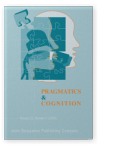On the relationship between speech acts and psychological states
Seungbae Park | Ulsan National Institute of Science and Technology, Republic of Korea
This paper defends a theory of speech act that I call concurrentism. It receives support from a psychological study and goes well with evolutionary theory. It sheds light on what the hearer believes when he hears an indicative sentence, what the speaker believes when he says an indicative sentence, what the speaker does after he says an indicative sentence contrary to what he believes, why Moore’s paradox occurs, why it is puzzling to say some variants of Moorean sentences, and why it is not absurd to say other variants of Moorean sentences. It will become clear that other things being equal, we believe that other people speak as they believe, and we speak in accordance with what we believe. It will also become clear that after we speak contrary to what we believe, we keep to ourselves the discrepancy between what we speak and what we believe, ceteris paribus.
References (20)
Audi, Robert
(
1994)
Dispositional Beliefs and Dispositions to Believe.
Noûs, 28(4), 419–434.


Baker, Lyn R
(
1995)
Explaining Attitudes. Cambridge: Cambridge University Press.


Braithwaite, Richard B
(
1932-1933)
The nature of believing.
Proceedings of the Aristotelian Society, 331, 129–146.


Bromwich, Danielle
(
2010)
Clearing conceptual space for cognitive motivational internalism.
Philosophical Studies, 148(3), 343–367.


Cohen, Jonathan
(
1992)
An Essay on Belief and Acceptance. New York: Oxford University Press.

Dennett, Daniel C
(
1978)
Brainstorms. Cambridge: MIT Press.

Festinger, Leon, & Carlsmith, James
(
1959)
Cognitive consequences of forced compliance.
Journal of Abnormal and Social Psychology, 581, 203–201.


Marcus, Ruth B
(
1990)
Some revisionary proposals about belief and believing.
Philosophy and Phenomenological Research, 501, 132–153.


Moore, George
(
1944)
Russell’s theory of descriptions. In
Paul Schilpp (Ed.),
The Philosophy of Bertrand Russell (pp. 175–225). La Salle, Ill.: Open Court.

Moore, George
(
1993)
Moore’s paradox. In
Thomas Baldwin (Ed.),
G. E. Moore: Selected Writings. London: Routledge.

Park, Seungbae
(
2015)
Accepting our best scientific theories.
Filosofija. Sociologija, 26(3), 218–227.

Price, Henry
(
1969)
Belief. London: Allen & Unwin.

Quine, Willard V.O
(
1960)
Word and Object. Cambridge, MA: MIT Press.

Ryle, Gilbert
(
1949)
The Concept of Mind. New York: Barnes & Noble.

Ramsey, Frank P
(
1931)
The Foundations of Mathematics, and Other Logical Essays. London: Routledge & Kegan Paul.

Schwitzgebel, Eric
(
2001)
In-between believing.
The Philosophical Quarterly, 511, 76–82.


Schwitzgebel, Eric
(
2002)
A phenomenal, dispositional account of belief.
Noûs, 361, 249–275.


Stalnaker, Robert
(
1984)
Inquiry. Cambridge: MIT Press.

Travis, Charles
(
2003)
Unshadowed Thought. Cambridge: Harvard University Press.

Williams, John N
(
2013)
The completeness of the pragmatic solution to Moore’s paradox in belief: A reply to Chan.
Synthese, 190(12), 2457–2476.


Cited by (1)
Cited by 1 other publications
Park, Seungbae
2019.
The Disastrous Implications of the ‘English’ View of Rationality in a Social World.
Social Epistemology 33:1
► pp. 88 ff.

This list is based on CrossRef data as of 15 july 2024. Please note that it may not be complete. Sources presented here have been supplied by the respective publishers.
Any errors therein should be reported to them.
